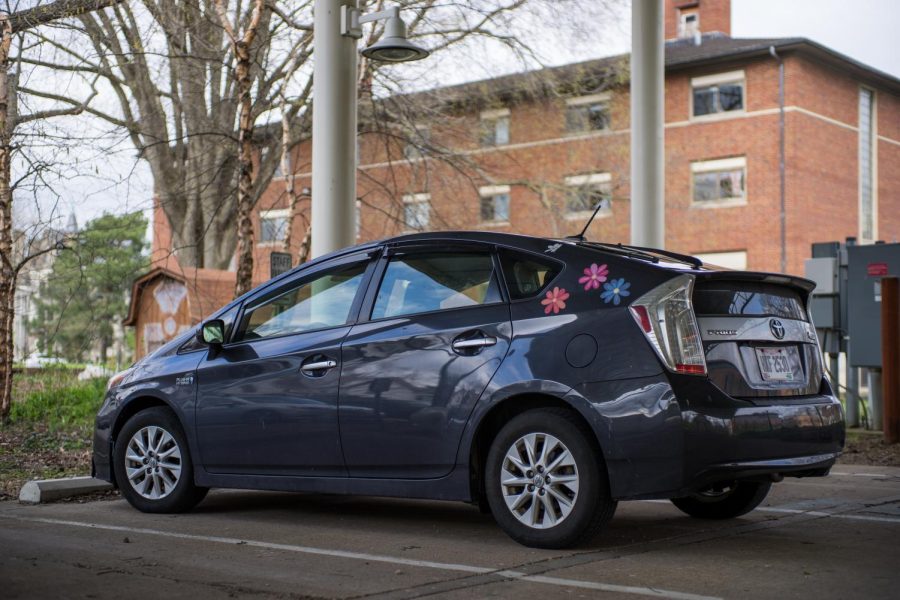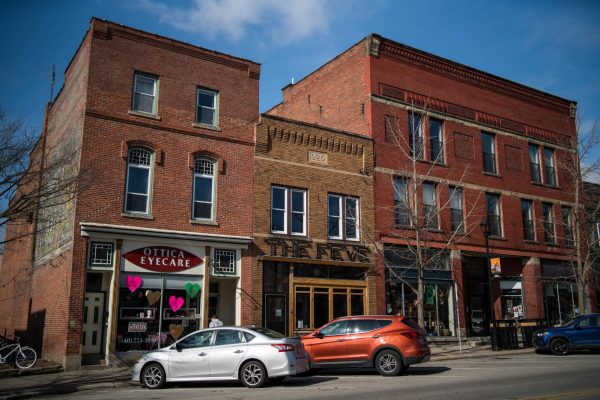Council Assesses Electric Carshare Program
Last week, Oberlin City Council evaluated new data on the City’s Electric Vehicle Carshare program.
Last week, Michael Peters, cofounder of electric carshare service Sway Mobility, presented data on the program’s use to the Oberlin City Council. The data revealed that the program has experienced low usage since its establishment in 2021 and that more College students than Oberlin residents have used the service, even though the program was intended to primarily support residents.
The City originally implemented the program April 1, 2021, after Oberlin City Council voted to approve it in 2020. At the time of the program’s approval, the City set up a payment plan of $223,000 to Sway over the course of five years.
“I saw the service as a way for Oberlin to reduce its carbon emissions while also providing affordable, flexible transportation for Oberlin residents who do not own or have access to a car,” Ray English, an Oberlin City Council-member who voted in favor of the program in 2020, wrote in an email to the Review. “I was initially concerned that the service would not be workable for lower income residents because of high insurance deductibles. We were able to resolve that issue by increasing the amount of subsidy the city provided for the service.”
Peters’ update to the Council on how the program has fared over the past year demonstrated that the carshare program, which intended to cut down on carbon dioxide emissions as part of the City’s Climate Action Plan, has prevented 27,000 pounds of carbon dioxide emissions.
The data also revealed that College students have made up the majority of program participants in the last year. Despite a survey prior to the program’s approval showing that 52 percent of Oberlin residents would be interested in using Sway, since the service’s implementation, 280 of the 339 total users are students while only 59 are community members. This disparity has sparked concern that the City is effectively subsidizing the program to the benefit of College students rather than the larger community.
However, the recent data also appears to show that although more students have used the program, some Oberlin residents might use the program more consistently. 10 Oberlin residents are responsible for over 33 percent of the total miles driven on the cars in the past year. Still, Oberlin City Council Vice President Kelley Singleton, who voted against the implementation of the car service in 2020, does not feel that the program has serviced the broader community.
“Of just those 10 people, they’ve used 14,000 miles out of 41,000 miles,” he said. “It was originally sold to us as something that would help the community, and right now, it doesn’t seem to be doing that.”
To use the car service, residents and students of Oberlin must schedule a time to use the car and pay $8 an hour. Most use the car to conduct errands or short drives, and users who damage the car or use the car past their scheduled time incur penalties.
For students, many of whom do not own cars, temporary access to a vehicle allows for the opportunity to run errands that fall outside of walking distance or explore northeastern Ohio, potentially explaining why so many students have used the carshare program. This service might be especially enticing for students since the College’s ride-sharing service shut down during the pandemic and has not reopened since. However, although a significant number of students have used the program, some have encountered issues with the service.
“We ended up getting to the car and [had] some difficulty trying to get into the car,” College first-year Calvin McMurtrey said. “Once we got it finally set up and ready to go, it said that the car only had 45 miles left on it. … We were planning on taking it into Cleveland, which would’ve been a 55-mile round trip. [The car] just wasn’t provided with the charge to get where we needed to go.”
College second-year Emma Rekate also believes she suffered an unjust penalty when she used the carshare service.
“There was one time I rented it out ’cause me and my friends wanted to go thrifting for a couple hours,” she said. “When we got in the car, I noticed there was sand on the ground from whoever was there previously. I returned the car in the exact way [we found it] and they … charged me $50. They’re like, ‘Oh, you left this car dirty and everything.’ But I’m like, ‘We didn’t even go to a place where there was sand.’”
Given that the program does not appear to serve the Oberlin community holistically, Singleton believes that the City could make better use of its Sustainable Reserve Fund, which funds the carshare program, to improve transit options or decrease carbon emissions. Suggestions for redirecting these funds include funding programs like the Oberlin Connector, which provides transit services to Cleveland or replacing city vehicles with electric cars.
“The thing with Oberlin is yes, we’re a city, but we’re barely a city… it’s not a bustling metropolis, so yes… this to me seems like it’s a nice idea and it’d probably work in a bigger place,” Singleton. “We just don’t have the population to back a program like this.”
Even though the City has a five year agreement with SWAY, the contract renews every year, so the City has an option to end the program early if the Council agrees to reevaluate its involvement with SWAY. At this time there are no official plans to re-evaluate the program.







